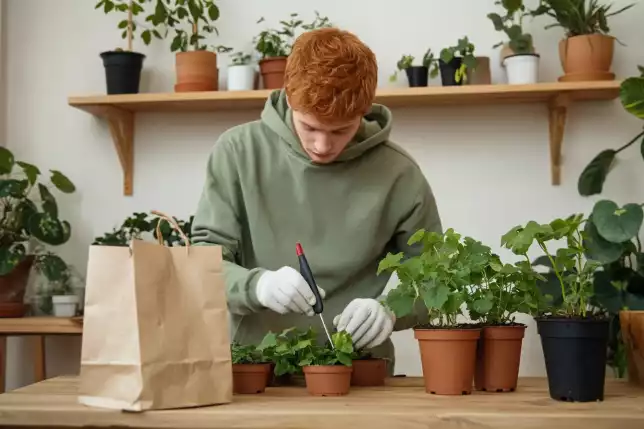Introduction
Starting a kitchen herb garden is a rewarding way to have fresh herbs at your fingertips. Growing your own herbs is cost-effective, eco-friendly, and elevates your home-cooked meals with vibrant, fresh flavors.
1. What Is a Kitchen Herb Garden?
A kitchen herb garden is the practice of growing culinary herbs right at home, indoors or outdoors, for easy access when cooking. Whether you prefer indoor potted herbs or an outdoor garden, this guide covers everything you need to get started.

2. Benefits of Growing Your Own Herbs
Culinary Benefits
Fresh herbs enhance the flavor of any dish, from soups to salads. Having a ready supply at home ensures you’ll always have the best-tasting ingredients.
Health and Wellness
Herbs offer nutritional value and medicinal properties. For example, rosemary supports digestion, while mint helps relieve headaches.
Environmental Impact
By growing your own herbs, you reduce food miles and contribute to a more eco-friendly lifestyle. Plus, it supports sustainable gardening practices.
3. Essential Tools and Materials for Starting a Kitchen Herb Garden
Containers and Pots
Choose containers with good drainage that fit your space. For example, rosemary thrives in terracotta pots, while basil does well in plastic containers.

Soil and Fertilizers
Use high-quality, well-draining potting soil. Organic fertilizers like compost or fish emulsion will help your herbs thrive.
Lighting Options
If growing indoors, herbs need 6-8 hours of sunlight. Grow lights are essential for herbs like basil and cilantro if your home lacks natural light.
Watering Tools
Watering cans, self-watering pots, or even a drip irrigation system can help keep your herbs hydrated without overwatering.
4. Best Herbs for a Kitchen Herb Garden
Top 10 Culinary Herbs to Grow
Include popular herbs like basil, parsley, cilantro, mint, rosemary, thyme, oregano, chives, dill, and sage.
Herbs for Indoor Growing
Indoor-friendly herbs like mint, parsley, and chives thrive in low-light conditions and limited space.
Herbs for Outdoor Gardens
Hardier herbs like rosemary, oregano, and sage do well in outdoor garden beds with full sunlight.
5. Step-by-Step Guide to Planting Your Kitchen Herb Garden
Choosing the Right Location
Place your herbs near the kitchen for easy access. Ensure they get the right amount of sunlight—outdoors or indoors near a window.
Planting Herbs from Seeds vs. Transplants
Growing from seeds is more affordable, while transplants offer a quicker harvest. Choose what suits your schedule and space.
Planting in Containers vs. Directly in the Ground
Container gardening allows flexibility and control, while planting in the ground provides more space for growth.
Companion Planting for Herbs
Certain herbs like basil and parsley grow well together, while others like mint should be planted separately to avoid spreading.
6. Care and Maintenance of Your Kitchen Herb Garden
Watering Needs
Water herbs when the soil feels dry to the touch. Basil prefers more frequent watering, while rosemary needs less.
Pruning and Harvesting Tips
Regular pruning encourages growth. Harvest herbs like basil by pinching off leaves from the top, while for rosemary, snip sprigs from mature plants.
Fertilizing and Feeding Herbs
Feed your herbs with organic fertilizer every 4-6 weeks to encourage robust growth.
Common Pest and Disease Management
Use organic pest control methods, like neem oil, to protect your herbs from aphids and other pests.
For more details on growing rosemary, check out this guide.
7. Growing Herbs Indoors
Choosing the Best Indoor Herbs
Grow herbs like mint, basil, and parsley indoors. These herbs thrive in containers and are easier to manage in limited light conditions.
Light Requirements for Indoor Herbs
Ensure your herbs receive enough light by placing them in a sunny window or using grow lights for optimal growth.
Container Choices for Indoor Growing
Space-saving options like hanging pots or tiered shelves allow you to grow multiple herbs even in small spaces.
8. Harvesting and Preserving Your Herbs
When and How to Harvest
Harvest herbs before they flower for the best flavor. Snip basil leaves regularly to encourage bushy growth. For more information on rosemary and its uses, visit this comprehensive rosemary guide from Botanical Kitchen.
Drying Herbs for Long-Term Use
Hang herbs like oregano or thyme in a dry, dark area, then store in airtight containers once fully dried.
Freezing Herbs for Future Use
Chop herbs like parsley or cilantro and freeze them in ice cube trays with olive oil for easy use later.
9. Creative Uses for Fresh Herbs
Cooking with Herbs
Use fresh herbs in recipes like pesto, chimichurri, and marinades to enhance your dishes.
DIY Herb Projects
Create herb-infused oils, vinegars, or butters to use in cooking or as gifts.
Medicinal and Wellness Uses
Herbs like mint can be used in teas for digestion, while rosemary can be added to skincare routines for hair and scalp health.
10. Troubleshooting Common Issues
Why Aren’t My Herbs Growing?
Common problems include insufficient light or overwatering. Ensure your herbs are getting enough sunlight and that their soil drains well.
Dealing with Overwatering or Underwatering
Check soil moisture levels regularly. Herbs like rosemary need less frequent watering, while mint needs consistently moist soil.
Managing Pests Naturally
Use organic solutions like diatomaceous earth or neem oil to deter pests like aphids.
Frequently Asked Questions (FAQs)
Q: Can I grow herbs indoors year-round?
A: Yes, with the right conditions, such as proper lighting and watering, you can grow herbs indoors year-round.
Q: What herbs grow best in low-light conditions?
A: Herbs like mint, parsley, and chives thrive in lower-light environments, making them perfect for indoor kitchens.
Q: How do I prevent my herbs from wilting or yellowing?
A: Overwatering or underwatering can cause wilting and yellowing. Ensure you’re watering appropriately, and check that your soil has good drainage.
Q: Can I grow herbs together in one pot?
A: Yes, but be mindful of each herb’s water and light needs. Herbs like basil and parsley grow well together, while mint is best planted separately due to its invasive nature.
Conclusion
Growing your own kitchen herb garden is an enjoyable and practical way to elevate your home-cooked meals and improve your overall well-being. Start small with a few easy-to-grow herbs and expand your garden as you gain confidence.

